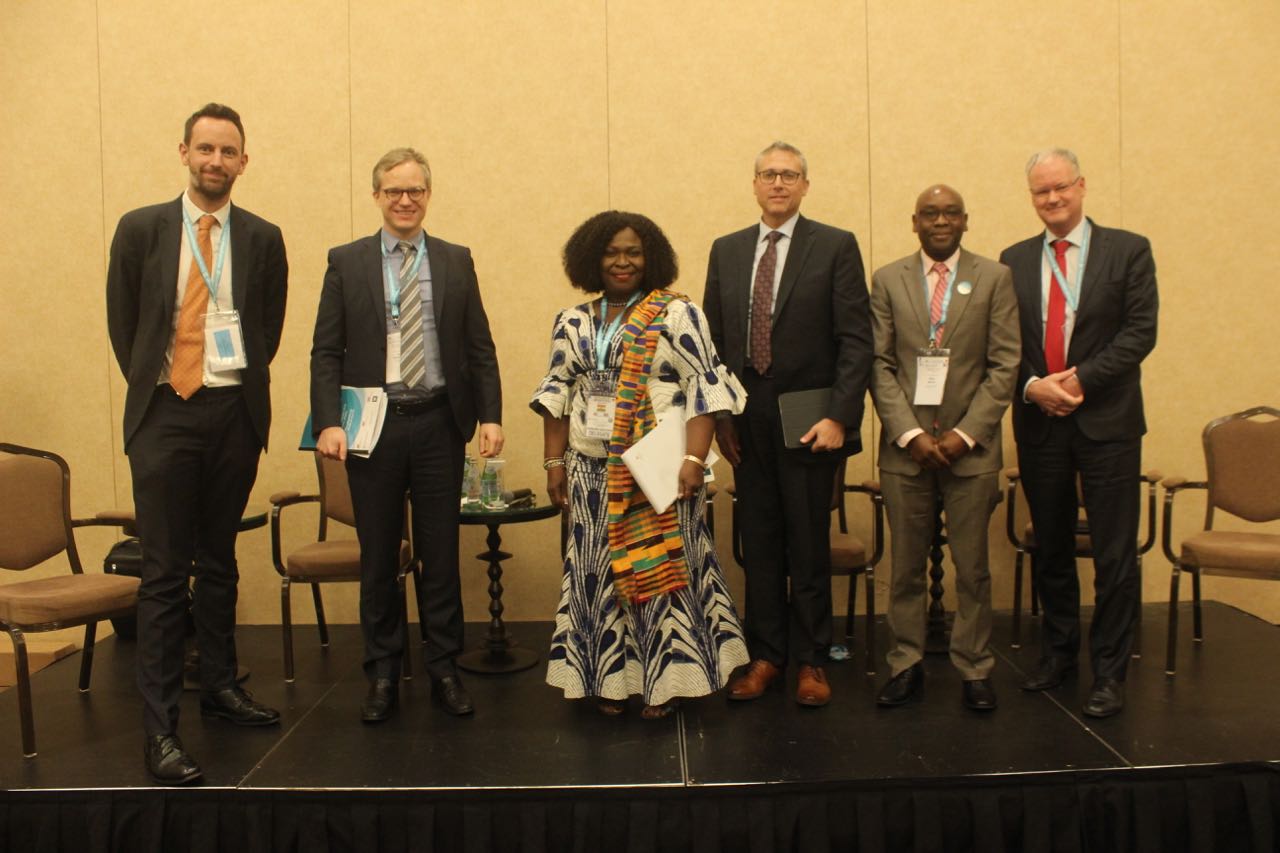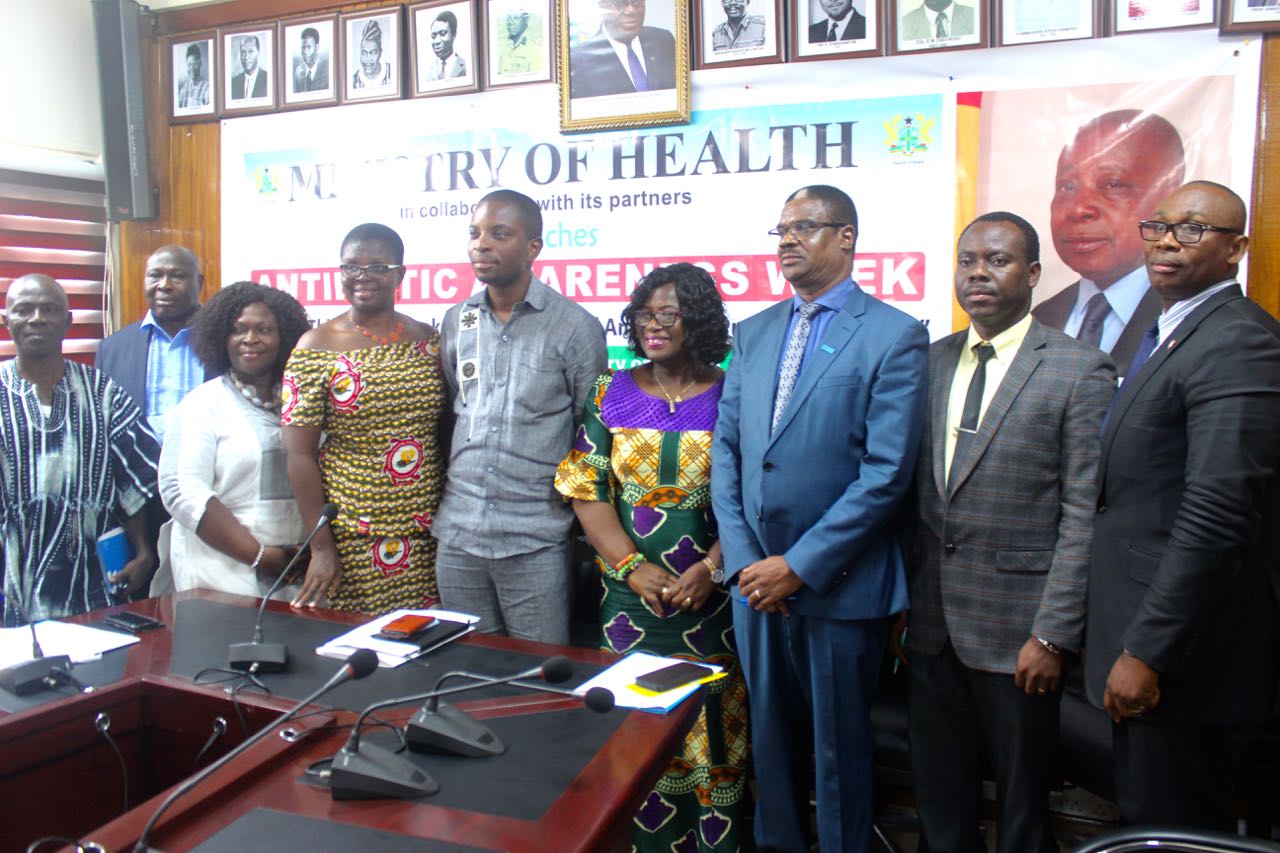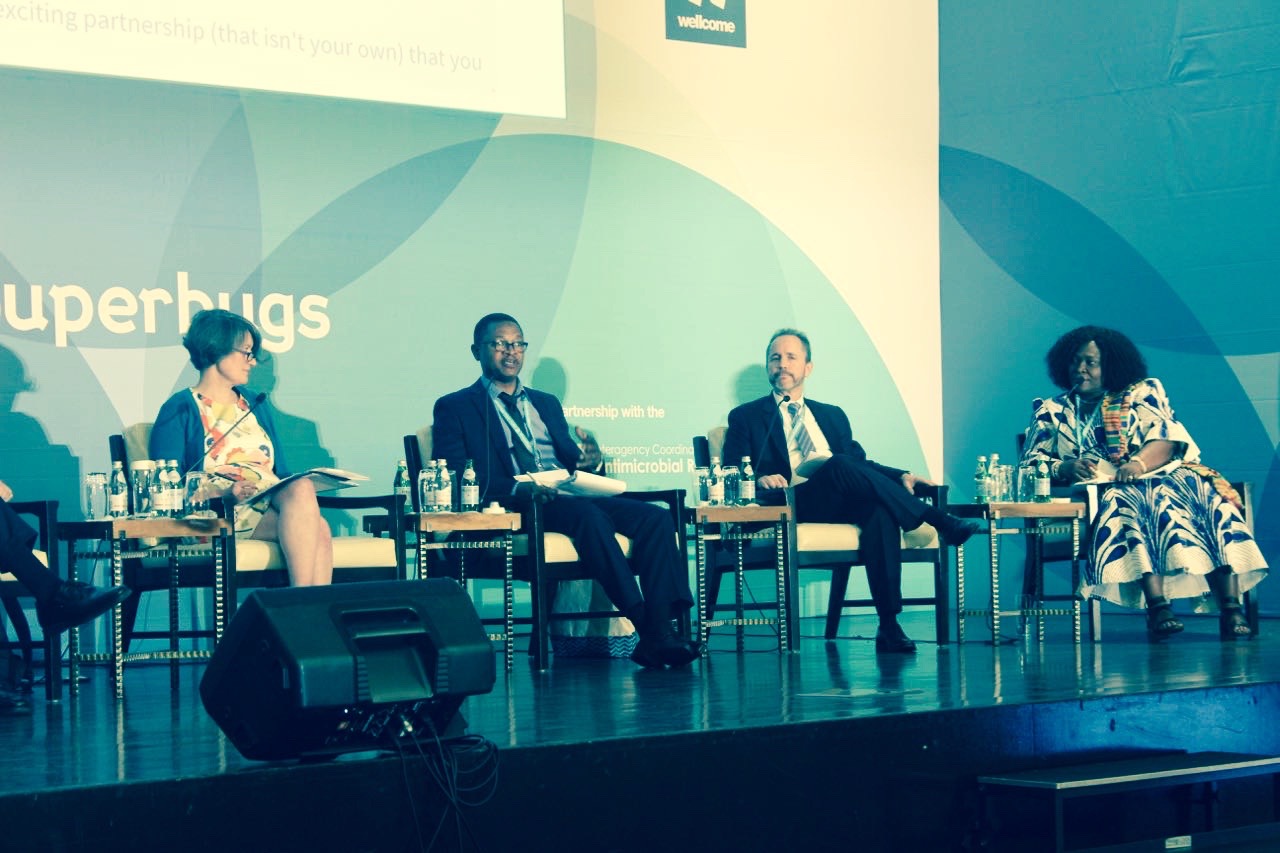Non State Actors for Health and Development – Ghana (NSA – Ghana) participates in hosting Antimicrobial Resistance (AMR) Call to Action.
Cecilia Senoo – President of NSA – Ghana and Doreen Pokua Gyau represented NSA – Ghana at this very important function.
It was not too long ago, to be precise in April this year, 2018 when the President of Ghana launched Ghana’s Anti-microbial Resistance Policy and National Action Plan, at an event at the Accra International Conference Centre.
Just to recap on this important event which took place in April 2018:
President Akufo-Addo at this event, noted that even though antimicrobials have been used to prevent and treat microbial infections, over the course of several years, over the last decade, however, anti-microbial resistance is threatening to derail the significant achievements made in the field of infectious disease therapy, animal and crop health, the environment, and our fisheries and aqua culture.

As co-Chair of the United Nations Advocates Group of Eminent Persons on the 2030 Sustainable Development Goals, the President stressed that the phenomenon of anti-microbial resistance represents a grave threat to the realization of SDG 3, which demands that countries ensure healthy lives and the promotion of well-being for all at all ages.
This, according to the President, warrants that all efforts are geared towards overcoming the resistance.
What this means, the President explained, is that simple treatment for infections, such as pneumonia or gonorrhoea, may no longer be possible because of antimicrobial resistance, adding that the world is already grappling with Drug Resistant Tuberculosis, which is threatening to undo decades of progress made in the treatment and control of TB.
The President stated that “Our food supply chain is also not being spared, because antibiotic resistance is a major challenge to animal husbandry, fisheries and aquaculture sectors, as Ghanaian research has shown. Our environment is also at risk, because of the effluents from industry that keep polluting the soil and water bodies.
He continued, “It is, thus, important that we recognize this, and the current steps we have taken to deal with the Resistance phenomenon, steps, which I am confident, are in the right direction.”
These developments, in consonance with the stance taken by the World Health Assembly urges all Member States to develop and put in place national action plans on anti-microbial resistance, which must be aligned with the objectives of the global action plan launched in May 2015. To this effect Ghana has followed suit and the President, Nana Addo Danquah Akufo-Addo therefore launched a national action plan together with a national policy document indicating that Ghana is ready to implement their contents.
“I am, therefore, tasking the SDG Secretariat to ensure their smooth and hitch-free implementation. Additionally, the Minister for Health and the Attorney General are to take the necessary steps to move some of the policy issues into legislation, to ensure our public health safety. Key among these are policies on the environment and waste, rational use of medicines, crop and animal production, and residues,” he said.
President Akufo-Addo was fortified in his belief that Ghana is well-positioned to join in the global effort to fight anti-microbial resistance.
“It is my hope that the committed implementation of the interventions outlined in these documents will guarantee the efficacy, as well as ensure the responsible use of antimicrobials, and, thereby, preserve them for future generations. We are mobilizing domestic resources to deal with this menace, a mobilization which is an integral part of our vision of creating a Ghana Beyond Aid,” he added.
President Akufo-Addo urged all Ghanaians to join hands in the implementation of the anti-microbial resistance plan, stressing that “together, we can effect change in the handling and use of antimicrobials.” He also challenged industry to come out with new innovations and formulations of antimicrobials, vaccines and diagnostics, as the country seeks to combat the resistance phenomenon.
“I also charge the Inter-Ministerial Committee on the Implementation of the SDGs to incorporate the various indicators for anti-microbial resistance into their work stream, and ensure that the achievement of SDG 3, by the target date of 2030, is realized,” he concluded.
Following up on this very important event, Ghana again hosted the Call to Action and led the global response on Antimicrobial Resistance (AMR)
The main agenda is to warn that despite pockets of country-level innovation, international progress is stalling and that critical gaps in action to address the rise and spread of drug-resistant superbugs are putting recent progress in peril.
Health representatives from national governments and agencies, civil society, the private sector and global philanthropies met in Ghana to focus on ambitious action to tackle this problem once and for all and NSA – Ghana was duly represented by Cecilia Senoo and Doreen Pokua ????
Government ministers, scientists, industry and civil society leaders met in Accra, Ghana, for the second international Call to Action on antimicrobial resistance (AMR), focussed on global, coordinated action to halt the spread of superbugs. According to the World Bank, by 2030, a further 24 million people in lower and middle-income countries (LMICs) will be pushed into poverty if effective action is not taken.
Faced with the heaviest burden of disease, LMICs are leading the way using pioneering activities to tackle superbugs. Tackling AMR requires a multisector approach – referred to as One Health – due to the interconnected nature of human, animal and environmental health. Reflecting this cross-cutting nature, groups from across governments, communities and sectors came together to develop innovative solutions aimed at reducing illness and death caused by superbugs.
Antimicrobial resistance – or AMR – occurs when antibiotics and other medicines used to prevent and treat infections cease to be effective (including for diseases such as malaria, TB, HIV and medical procedures such as organ transplants, cancer treatment, etc). This is a global issue that needs urgent attention from all sectors – human, animal and environmental health.
10 million people are at risk of dying annually from AMR-associated causes by 2050, with majority of these deaths looking to occur in Africa and Asia.
Ghana was therefore congratulated for hosting the Call to Action and leading the global response on AMR.
In Ghana, the UK has supported the development of an AMR National action plan (launched in April 2018); as well as field testing for AMR and support to veterinary laboratories.
Going forward, HMG’s Fleming Fund will provide support to tackle AMR in Ghana and support six Fleming Fund Fellows. The Commonwealth Fund on AMR Stewardship is also an exciting partnership which will link pharmacisists in the NHS with Ghana institutions. More generally, UK support to health systems and services in Ghana (and other countries) has helped tackle AMR by:
- Reducing the demand for antibiotics – through better quality of care including hygiene, improved sanitation, and vaccination.
- Increasing the number of effective antibotics – through developing new drugs, better diagnostsis of illness to match the treatment, research in agriculture.

Dr Jeremy Farrar, Director of Wellcome, said:
People are dying today, all around the world because of drug resistant infections. These infections threaten the whole of modern medicine. Surgery, safe child birth and treatment for cancer all become impossible if we cannot prevent and treat infections. We are at a pivotal moment for AMR.
In some areas we have made some progress which should be celebrated, but in many areas progress has stalled. It takes governments, industry, doctors and whole communities to help make the world safe from superbugs, and we must ensure the political momentum is there to push us further and faster towards this goal.
Interventions that have already been shown to be cost effective at the local level will be presented at the event to inspire leaders and connect the groups to other countries where the programmes could also work. These ideas include:?
- An initiative in Tanzania to reduce inappropriate use of antibiotics through a network of accredited outlets called Accredited Drug Dispensing Outlets (ADDOs). Trained drug dispensers now work across Tanzania to sell appropriate antibiotics, educate people and reduce the incidence of drug-resistant infections across the country.?
- In India, the ‘Superheroes Against Superbugs’ initiative is spreading awareness of antibiotic resistance to young children through comics, storytelling and role play. Through workshops, the team are helping to start a better conversation about the proper use of antibiotics and encouraging children to spread these messages to their parents and wider community.
- In Ghana, the Christian Health Association (CHAG) is improving pharmaceutical service and healthcare through improved access and appropriate use of quality-assured medicines in church health systems. They are also tracking hand hygiene practices, hospital-acquired infections and the general attitudes, knowledge and practices towards AMR.
A recent report from the World Health Organization (WHO) does however point to progress– 93% of countries surveyed are developing or have developed a national action plan, a tool established to ensure countries are making a robust plan to address AMR, up from 85% the previous year. However, only 38% of countries have implemented this plan, and 15% of countries have no plan at all, highlighting that there is still a significant way to go if we are to turn the tide on AMR.
Philip Smith, Department for International Development (DFID), Ghana Country Director said:
Anti microbial resistance is one of the world’s greatest threats to human health. I’m proud that the uk government and Ghana are working together on this important issue. This is a great example of the enduring partnership between uk & Ghana.
Kwaku Agyeman-Manu (MP), Minster for Health, Ghana, said:
Antimicrobial resistance is a developmental issue that seeks to threaten and wipe out all the majority of the gains of the Sustainable Development Goals (SDGs). Everyone must take action; big country or small country, rich or poor because we are all at risk.
Ghana is pursuing this health security threat and making sure this is followed under One Health Agenda because it is the right thing to do, especially so when His Excellency the President of the Republic Nana Addo Dankwa Akufo-Addo is a co-advocate for the SDGs.
Pursuing the Agenda 2030 by leaving no one behind becomes meaningless if we do not pay attention not just on the development of action plans, but through effective implementation of the plans and strategies for accountable governance and also keeping the momentum on antimicrobial resistance. This second Call to Action is a call for commitment and also to ensure that all the ‘voices’ are heard and their inputs also shapes recommendations for monitoring strategies and activities.
The Call to Action event in Accra on November 19 and 20 2018 was co-hosted by the government of Ghana, Thailand and the UK, along with the Wellcome Trust, World Bank and the UN Foundation in partnership with the Inter-Agency Coordination Group (IACG) on Antimicrobial Resistance. It was the second time the event had been held, following the event in Berlin in 2017. Since then, much great work has been done, but progress is fragile and not where it needs to be to effectively tackle the problem of superbugs.
By May 2019, the Inter-Agency Coordination Group (IACG) on Antimicrobial Resistance will submit their report to the UN Secretary General. This includes making recommendations on how to better coordinate action across sectors and countries, as well as serving as a vehicle for building political momentum and future governance, and mobilising a broad base of stakeholders. The UN Secretary General will then report back to the UN General Assembly in 2019. When AMR was tabled at the UN General Assembly in 2016, it was only the fourth time in history of the UN that a health topic had been discussed at the UN General Assembly, representing the severity of the issue for every country around the world.
Civil Society definitely have a role to play in ensuring gains from many years are not destroyed by these superbugs and any way we can contribute to the implementation of the AMR policy and Action Plan, we must – for the sake of ourselves and our future children.
Credit:
- Business Ghana
- Joy online
